Review for Twilight's Last Gleaming (1977) (Masters of Cinema)
Introduction
There are plenty of reasons why I wanted to review Twilight’s Last Gleaming. It’s a Cold War era political thriller with fingers poised on the nuclear launch button, a genre that I’m a sucker for, being a child of the Cold War. It’s directed by Robert Aldrich, and it stars one of my favourite actors, Burt Lancaster. It’s also a film from the pre-multiplex, pre-blockbuster era, when scripts had to be smart, and you couldn’t bury a movie’s shortcomings under a hundred million dollars of special effects. That’s just the kind of movie that I want to watch these days, but what really attracted me to Twilight’s Last Gleaming was the PR blurb, the story synopsis convincing me that I had seen the film before. It turns out that I hadn’t seen Twilight’s Last Gleaming before last night, but I have seen this movie before, after a fashion.
A quiet, inauspicious Sunday is not when you expect doomsday to begin, but that’s what it looks like when an Air Force car is hijacked on a quiet forest road in Montana by four escaped convicts. For these four men head to a missile silo, spoof the security, and get as far as the missile launch control room. Soon President David Stevens’ pleasant Sunday morning is interrupted by a phone call. They want $10 million, safe passage to a country of their choosing, on Air Force One, with the President of the United States as their hostage, or they will launch nine Titan ICBMs tipped with nuclear warheads, all aimed at the Soviet Union. But that’s actually the least of what Air Force General Lawrence Dell, the leader of the extortionists wants, and if he doesn’t get what he’s really after, it might just be the end of the world.
Picture
Twilight’s Last Gleaming gets a 1.85:1 widescreen 1080p transfer on this Blu-ray. It’s an excellent transfer, clear and sharp throughout with strong, consistent colours, and excellent detail, all without losing the inherent grainy filmic quality of the source material. A lot of vintage film transferred to Blu-ray will exhibit a slight wobble, as the film shifts in the frame, usually evident during credit sequences where text can visibly move. Twilight’s Last Gleaming is rock, solid stable throughout, with only a little flicker during the split screen sequences, probably an artefact of the special effects process behind it. Twilight’s Last Gleaming saw a 2k restoration of the original film negative for its US release in 2012 and Eureka Entertainment benefit from that sterling work with their UK release.
The images in this review were kindly supplied by Eureka Entertainment
Sound
The film gets a PCM 2.0 Mono English track encoded at 2.3 Mb per second, with optional English subtitles. Obviously it is a centre speaker affair, but the audio is mostly fine, clear, and brings across the drama and intensity of the film well. There are one or two moments where the dialogue will suddenly sound a little muddy, as if taken from a lower fidelity source, but there’s really only one point that it becomes obvious, an early phone conversation between Dell and Mackenzie. The dialogue is mostly clear though, except for when the characters speak over each other, or some period slang gets me scratching my head. The script is excellent though, with some great dialogue. I’m less sure about Jerry Goldsmith’s score for the film, which at times is overwrought and obvious.
Extras
The disc boots straight to a static menu.
The sole extra on the disc is the feature length Aldrich over Munich: The Making of Twilight’s Last Gleaming documentary. It features interviews with Aldrich’s biographer, his daughter, some of the German crew that worked on the film, Gerald S. O'Loughlin who played O’Rourke in the film, and it looks at the director, the script, the cast and crew, and the filming process and more. This is an excellent documentary that is well worth watching. It was made in 2012, and the only thing it’s lacking is some archive interview footage.
You also get the Masters of Cinema booklet. This 36 page affair offers a new essay from Neil Sinyard on the film, as well as an interview with Robert Aldrich conducted in 1977.
Conclusion
I did in the end realise where I had seen this story before. Take the intelligence out of the script, the sparkling dialogue, the character, and replace it with lots of burly men shouting, and shaky cam visuals, and you have Michael Bay’s The Rock, a similar tale of an honourable soldier pushed to criminal actions, using the threat of WMDs to force a secretive government to reveal the truth about a contentious war. The Rock is pure action movie, summer blockbuster bombast, but it has the benefit of Sean Connery. Twilight’s Last Gleaming is a more interesting movie to be sure, thought provoking and nuanced, but it has its flaws that prevent it from being a classic. Although it certainly didn’t deserve to be the critical and commercial flop that it was back in 1977.
That is all down to timing of course. Following the assassination of JFK, the Vietnam War and especially following Watergate, the USA entered a period of introspective contemplation about its identity that revealed a distinct distrust of authority, and government in particular. That resulted in a period of rough, gritty, and downbeat cinema that erred on the side of pessimism. Twilight’s Last Gleaming is a perfect example of such storytelling, where a dishonoured general attempts to reveal the complicity of the US Government in engineering the Vietnam War as an exercise in Cold War brinkmanship to challenge the Soviet hegemony, regardless of the cost in human lives, only to learn the cynical lengths to which the administration will go to just to keep their secrets.
Three years previously, this film probably would have been a smash hit, but audiences were by now tiring of cynicism in films. They wanted optimism, and they wanted the good guys to win again. Twilight’s Last Gleaming was released in February 1977. Just three months later, a small film from George Lucas was released and changed the movie industry forever. The irony is that many critics of the time saw Star Wars as George Lucas’ own commentary on the Vietnam War. Also cynicism about the government was still a shocking thing back in the 1970s, the naivety of a young nation shattered by the mendacities of its leaders. Now, cynicism is the normal state of play, with George W. Bush’s War on Terror met with a universal “It’s about the oil, right?”
That cynicism certainly colours my perceptions of Twilight’s Last Gleaming, which posits a US administration which is presented as being fully aware of the inability to ‘win’ the quagmire in Vietnam, and choosing to prosecute the war anyway to show the USSR that the US is willing, and able to use its guns, that it is crazy enough to push the button if provoked, all to preserve the ‘peace’ of mutually assured destruction. The film is set in the then near future of 1981, to allow for a new President in the White House, just one year into his term. Lawrence Dell’s idealistic naivety is easier to accept, an honourable man, he expected to be treated with honour by his superiors and his government, but when he learned the truth about Vietnam and wanted to share it, he was sidelined and then imprisoned.
President David Stevens’ outrage when he learns the truth is a little harder to countenance, given that he has to be a consummate politician, and especially given that when we meet him he’s indulging in some political expediency of his own regarding a potential pardon. I get the feeling that this conflict between cynicism and naivety was wholly apparent to the filmmakers as well, as the climax of the film really ups the cynicism, suggesting just what lengths the US government will go to, just what they are willing to sacrifice to hold onto their secrets. But for me this is another note that just doesn’t ring true.
Structurally, this is a strong film though, a well put together thriller that entertains and can get the heart pumping at times. Four men take over a nuclear missile silo, putting their fingers on the launch button, and threatening World War III if their demands aren’t met. You have the President and his advisors in the White House trying to deal with the problem, and you also have the military in the field, personified by General Mackenzie as played by Richard Widmark, tasked with stopping the extortionists by whatever means. The drama is really strong, tensely paced, and made all the more effective by means of split screen imagery. At one point when Dell is pushed to starting the launch sequence, you get the silo, the military, and the Oval Office on screen at the same time, the mayhem unfolding in three locations, and it really does have you on the edge of the seat.
This tenseness is balanced by some moments of humour, and some interesting screen interplays. You have the playful friendship of President Stevens and his aide O’Rourke on one side, and the more fractious relationship between Dell and one of his men, Powell on the other. But there’s honesty and no little humour in their respective situations. There are moments of satire and comedy to balance the drama, but there are also moments of inadvertent humour as well, such as the Air Force’s first attempt to deal with the situation, sending in a couple of men with a ‘micro-nuke’. They’re supposed to sneak in, plant the bomb, and sneak out, only they come in like the Keystone Cops (it doesn’t help that one of them is Cliff from Cheers, John Ratzenberger). What should be tense and dramatic really looks daft. The irony is that it triggers the most dramatic moment in the film.
Twilight’s Last Gleaming doesn’t quite work for me. In terms of screen portrayals of Presidents, it lies somewhere between Thirteen Days and Escape From New York for me, which is a strange place. As I’ve mentioned, my innate cynicism about politics and how the world works makes aspects of this film feel quaint, and there’s an unevenness of tone that doesn’t help it sustain the suspense. On the other hand it has great characterisation, an intelligent script with meaty dialogue, and when it does work it can have you gripped. It is very much worth a watch.
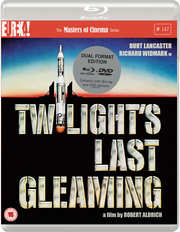





















































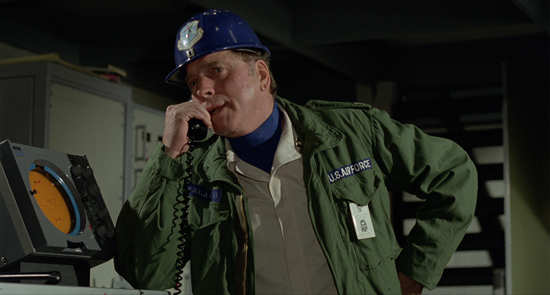
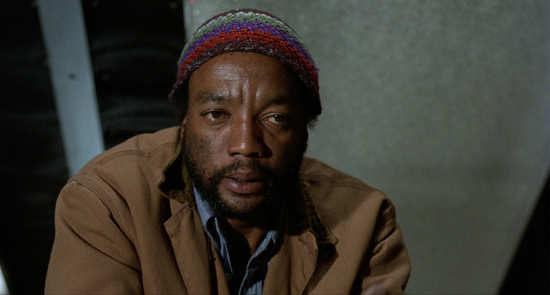
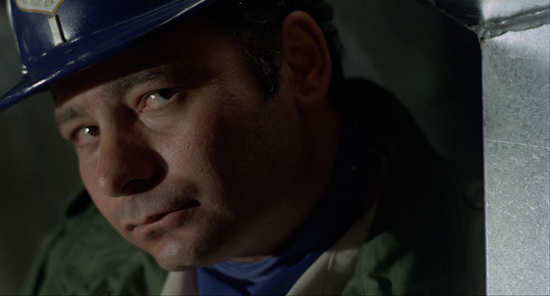
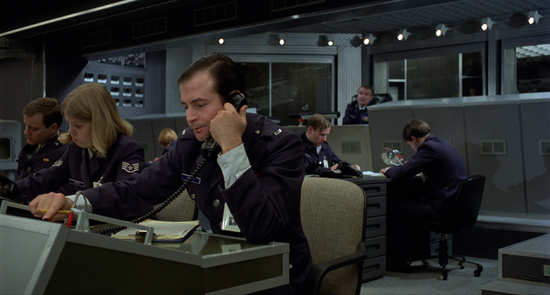
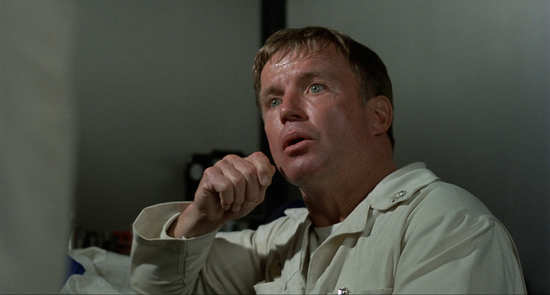
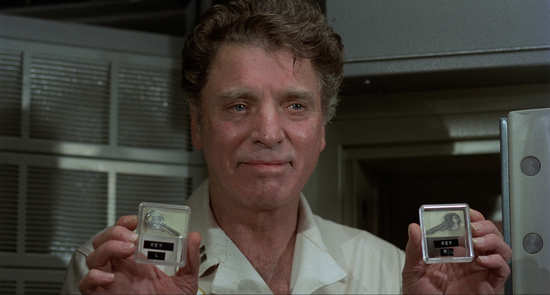
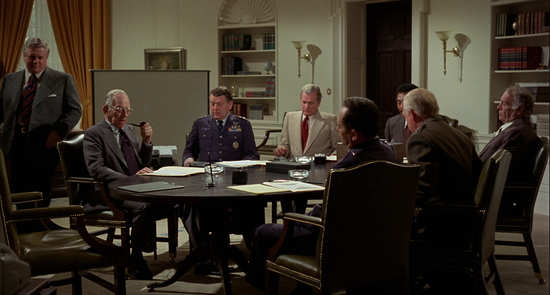
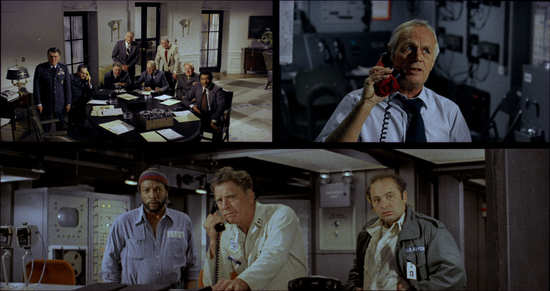
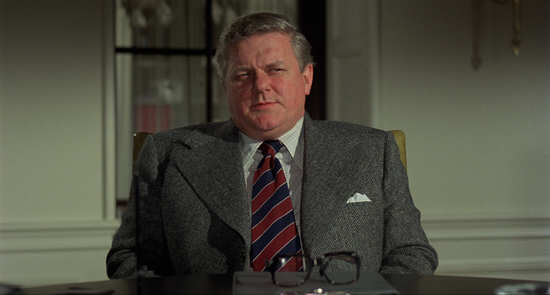
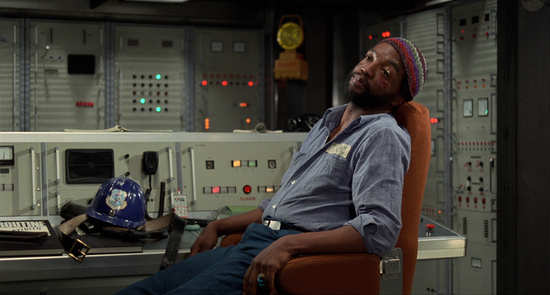
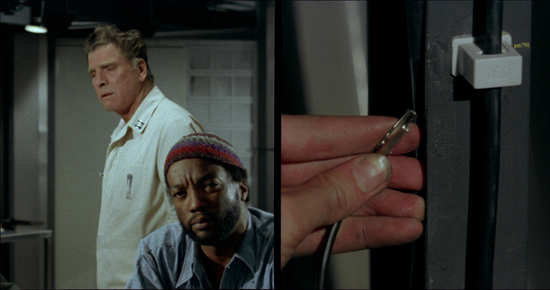
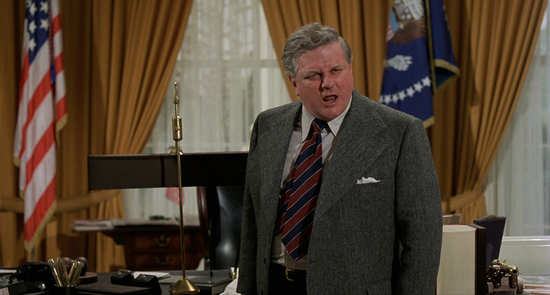
Your Opinions and Comments